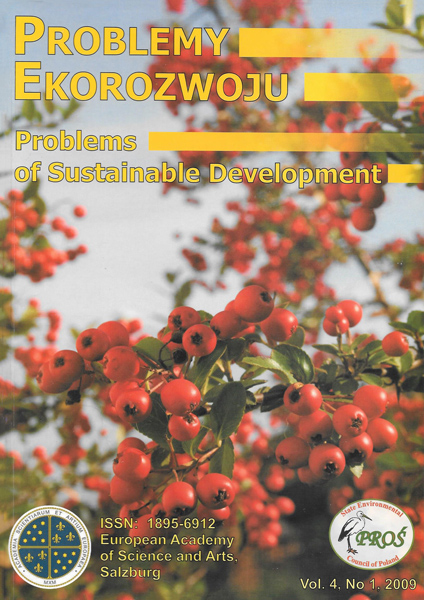Sustainable Development Versus Political Aspect of Defining the Nature
Article Sidebar
Issue Vol. 4 No. 1 (2009)
-
From the Polish Minister of Environment
Maciej Nowicki9-10
-
About the State Environmental Council of Poland (PROS) and the Future of “Problemy Ekorozwoju/ Problems of Sustainable Development”
Tomasz Winnicki11-13
-
Sustainable Activism, The Center for Energy and Environmental Policy, and Experimental Learning
Paul T. Durbin15-32
-
Sustainable Development (1987-2005) – an Oxymoron Comes of Age
Michael R. Redclift33-50
-
The Idea of Philosophy vs. Eco-Philosophy
Andrzej Papuziński51-59
-
Convincing Industry that there is Value In Environmentally Supply Chains
Joseph Sarkis61-64
-
The Sustainable Development Revolution
Artur Pawłowski65-76
-
Sustainable Development Versus Political Aspect of Defining the Nature
Jacek Leszek Łapiński77-81
-
Sustainable Development in the Discourse over the Polish Wildlife Conservation Concept after 1989
Czesław Wodzikowski83-92
-
Subsidiarity in EU Environmental Policy
Barbara Hartman93-98
-
Market Mechanisms in Environment Protection as Sustainable Development Factor
Andrzej Graczyk99-108
-
The Premises of Renewable Energy Sources Market Development in Poland in the Light of Sustainable Development Idea
Alicja Pultowicz109-115
-
Biofuels – a Step Towards Sustainable Development
Sabina Dołęgowska117-121
-
Problems of Sustainable Use of Mineral Resources
Agnieszka Gałuszka, Zdzisław Migaszewski123-130
-
Development in Postmodern Time
Jerzy Janikowski131-134
-
Letter to the Editorial Office: Work on Sustainability
John Ikerd161-162
-
Letter to the Editorial Office: Global Ballistic Missile Defense and Strategy of Zero Growth vs. Necessity of Global Cooperation for Sustainable Development
Lesław Michnowski161-165
-
Communiques on Activities of the State Environmental Council of Poland
Tomasz Winnicki135-153
-
EEAC, the Way Ahead in the Light of the Last Five Years
Frans Evers141-142
-
On the Politics of Sustainability a Long Way Ahead EEAC, the Way Ahead in the Light of the Last Five Years
Tim O’Riordan155-159
-
Work on Sustainability
John Ikerd161-162
-
Global Ballistic Missile Defense and Strategy of Zero Growth vs. Necessity of Global Cooperation for Sustainable Development
Lesław Michnowski163-165
Archives
-
Vol. 6 No. 2
2011-07-01 19
-
Vol. 6 No. 1
2011-01-03 18
-
Vol. 5 No. 2
2010-07-01 21
-
Vol. 5 No. 1
2010-01-04 16
-
Vol. 4 No. 2
2009-07-01 19
-
Vol. 4 No. 1
2009-01-05 22
-
Vol. 3 No. 2
2008-07-01 19
-
Vol. 3 No. 1
2008-01-02 12
-
Vol. 2 No. 2
2007-07-02 13
-
Vol. 2 No. 1
2007-01-02 11
Main Article Content
Authors
Abstract
Political view on the nature is an attempt to define a scope for human intervention into the world of nature, and rather giving an answer to the problem how far the nature can be regarded as reality independent from human being. Major factors determining political way of defining the nature are: the idea of ecological survival and the idea of implementation of technology and improving the society. They result in destruction of harmony between the human being and the nature, eroded trust compensated with growth of various systems of technical control, favoring experts-bureaucrats using their strategic game as a management tool.
From the political aspect, nature is a product of the society. Its form is a result of interaction driven by human in the area of nature as well as society where human or nature wellbeing is less important. The expert-bureaucrat’s victory has the priority (like completion of technological project, staying in power, etc..). The way of achieving the goal is based on a calculated risk strategy. Such a strategy is odd and against the sustainable development fundamentals.
Keywords:
References
BECK U., Społeczeństwo ryzyka. W drodze do innej nowoczesności, Wydawnictwo Naukowe Scholar, Warszawa 2002.
BÖHME G., Filozofia i estetyka przyrody w dobie kryzysu środowiska naturalnego, Oficyna Naukowa, Warszawa 2002.
BRATKOWSKI S., BRATKOWSKI A., Gra o jutro, PIW, Warszawa 1970.
CROZIER M., Biurokracja. Anatomia zjawiska, PWE, Warszawa 1967.
CROZIER M., FREIDBERG E., Człowiek i system. Ograniczenia działania zespołowego, PWE, Warszawa 1982.
GAŁKOWSKI J. W., 1992, Człowiek - przyroda - wartości, w: Humanizm Ekologiczny, vol. 1, s. 41-50.
HALLOWELL J. H., Moralne podstawy demokracji, PWN, Warszawa 1993.
JANNE H., Technika a system społeczny. Socjologia techniki, w: red. Siciński A., Technika a społeczeństwo. Antologia, t. 2, PIW Warszawa 1974, s. 7-39.
ŁAPIŃSKI J, Człowiek techniczny na tle współczesnej cywilizacji. Polityczne i moralne pole relacji, w: red. Latawiec A., Bugajak G., Między filozofią przyrody a ekofilozofią, red. Latawiec A., Bugajak G., Wydawnictwo UKSW, Warszawa 1999, s. 207-226.
MOLTMANN J., Bóg w stworzeniu, Znak, Kraków 1995.
SUTOR B., Etyka polityczna. Ujęcie całościowe na gruncie chrześcijańskiej nauki społecznej, Wydawnictwo Fundacji ATK „Kontrast”, Warszawa 1994.
SIMON Y. R., Filozofia rządu demokratyc¬nego, Wydawnictwo ARKA, Kraków 1993.
STONER J. A. F., WANKEL Ch., Kierowanie, PWE, Warszawa 1992.
von MISES L., Planowany chaos, Instytut Liberalno-Konserwatywny, Lublin 1995.
ZIĘBA S., Perspektywy ekologii człowieka, Wydawnictwo KUL, Lublin 2008.
Article Details
Abstract views: 59
License

This work is licensed under a Creative Commons Attribution-ShareAlike 4.0 International License.


